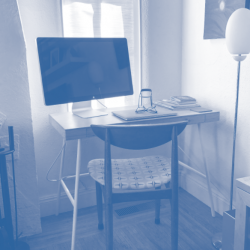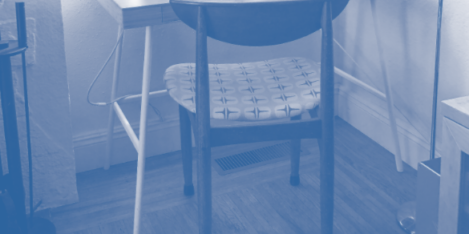January 22, 2021
Search Results for: working from home
December 18, 2020
Working from home stresses have had the greatest impact on women
by Neil Franklin • Flexible working, News, Wellbeing
 A review of research in organisational and workplace psychology conducted by an international team of academics claims that working from home has been more disruptive for women than men. The review paper, entitled COVID-19 and the Workplace: Implications, Issues, and Insights for Future Research and Action and originally published in American Psychologist, features urgent insight from UCL School of Management Professor, Sunny Lee into the sex- and gender-related implications of changes in work practices that have taken place over the course of 2020. (more…)
A review of research in organisational and workplace psychology conducted by an international team of academics claims that working from home has been more disruptive for women than men. The review paper, entitled COVID-19 and the Workplace: Implications, Issues, and Insights for Future Research and Action and originally published in American Psychologist, features urgent insight from UCL School of Management Professor, Sunny Lee into the sex- and gender-related implications of changes in work practices that have taken place over the course of 2020. (more…)
December 15, 2020
The majority of employees admit to boozing while working from home
by Jayne Smith • News, Wellbeing, Working lives
 To say that 2020 has been a tough year is an understatement, and it appears that there has been an increase in the amount of alcohol being consumed whilst working from home since the pandemic began, according to Health and Safety software company Protecting.co.uk. (more…)
To say that 2020 has been a tough year is an understatement, and it appears that there has been an increase in the amount of alcohol being consumed whilst working from home since the pandemic began, according to Health and Safety software company Protecting.co.uk. (more…)
December 10, 2020
Tech industry employees three times more stressed working from home than others
by Jayne Smith • News, Technology, Wellbeing
 Unify Square, the services provider for Zoom, Microsoft Teams, and Slack platforms, has released survey results around remote collaboration and communication among enterprises. The survey highlights key perspectives of enterprise employees on workplace collaboration and communication in the midst of the global pandemic. (more…)
Unify Square, the services provider for Zoom, Microsoft Teams, and Slack platforms, has released survey results around remote collaboration and communication among enterprises. The survey highlights key perspectives of enterprise employees on workplace collaboration and communication in the midst of the global pandemic. (more…)
December 4, 2020
Half of people say working from home has improved their relationships
by Neil Franklin • Flexible working, News
 A new study from Perkbox claims that the increased amount of time spent at home together under lockdown has actually strengthened many people’s personal relationships. Just under half (45 percent) of employees claim that their relationship with the people they live with has become stronger during their time working from home together. 51 percent say that their relationship is the same as before, with just 4 percent feeling that their relationship is now not as strong. (more…)
A new study from Perkbox claims that the increased amount of time spent at home together under lockdown has actually strengthened many people’s personal relationships. Just under half (45 percent) of employees claim that their relationship with the people they live with has become stronger during their time working from home together. 51 percent say that their relationship is the same as before, with just 4 percent feeling that their relationship is now not as strong. (more…)
November 25, 2020
Third of people working from home worry about mental health
by Jayne Smith • News, Wellbeing, Working lives
 In a recent survey of 4,000 office-based employees and 1,000 employers in the UK, U.S, Singapore and the UAE, a third of employees expressed concern for their mental health whilst working from home during the COVID-19 pandemic. The research, conducted by health benefits provider, Aetna International, examines the perceptions of both employers and employees when it comes to corporate health and well-being. (more…)
In a recent survey of 4,000 office-based employees and 1,000 employers in the UK, U.S, Singapore and the UAE, a third of employees expressed concern for their mental health whilst working from home during the COVID-19 pandemic. The research, conducted by health benefits provider, Aetna International, examines the perceptions of both employers and employees when it comes to corporate health and well-being. (more…)
November 25, 2020
Several factors impact wellbeing of people working from home
by Jayne Smith • News, Wellbeing, Working lives
 A new study on work-life balance claims that the COVID-19 crisis is a crucial factor – but not the only one – behind low levels of wellbeing among employees working from home. A research team including Professor Ilke Inceoglu, Professor of Organisational Behaviour and HR Management at the University of Exeter Business School, analysed data from 835 university employees, who completed a baseline questionnaire on wellbeing and took a weekly survey. (more…)
A new study on work-life balance claims that the COVID-19 crisis is a crucial factor – but not the only one – behind low levels of wellbeing among employees working from home. A research team including Professor Ilke Inceoglu, Professor of Organisational Behaviour and HR Management at the University of Exeter Business School, analysed data from 835 university employees, who completed a baseline questionnaire on wellbeing and took a weekly survey. (more…)
November 13, 2020
People working from home should be taxed for the privilege, says Deutsche Bank
by Neil Franklin • Flexible working, News
 People working from home should be taxed at a higher rate to compensate for the money they aren’t spending on commuting and other expenses, according to a new report from economists at Deutsche Bank. The report argues that the move could generate billions in additional revenue which could then be redistributed to lower paid workers and those who cannot work remotely. The report argues that this should have happened anyway given that the number of Americans who regularly worked from home had already increased by 173 percent between 2005 and 2018. (more…)
People working from home should be taxed at a higher rate to compensate for the money they aren’t spending on commuting and other expenses, according to a new report from economists at Deutsche Bank. The report argues that the move could generate billions in additional revenue which could then be redistributed to lower paid workers and those who cannot work remotely. The report argues that this should have happened anyway given that the number of Americans who regularly worked from home had already increased by 173 percent between 2005 and 2018. (more…)
November 12, 2020
New to working from home? Here is how you should set up
by Freddie Steele • Company news
 The past year has been something of a game-changer in many ways and perhaps one of the most unexpected has been how people have had to embrace the idea of working from home. (more…)
The past year has been something of a game-changer in many ways and perhaps one of the most unexpected has been how people have had to embrace the idea of working from home. (more…)
November 9, 2020
Working from home could energise some of our overlooked cities
by Michel Serafinelli • Cities, Comment, Flexible working
 For years, we have been promised a work-from-home revolution, and it seems that the pandemic has finally brought it to pass. In April this year, at the height of the first wave of coronavirus, 47 percent of people in the UK were working from home, the vast majority of them doing so because of the pandemic. In a sense this is overdue: the work-from-home potential for UK employees is 32 percent; in France, Germany and Italy between 24 percent and 28 percent. (more…)
For years, we have been promised a work-from-home revolution, and it seems that the pandemic has finally brought it to pass. In April this year, at the height of the first wave of coronavirus, 47 percent of people in the UK were working from home, the vast majority of them doing so because of the pandemic. In a sense this is overdue: the work-from-home potential for UK employees is 32 percent; in France, Germany and Italy between 24 percent and 28 percent. (more…)
October 9, 2020
Working from home seems to relieve the burden of imposter syndrome
by Neil Franklin • Flexible working, News, Working lives
 In a new study of around 2,000 workers conducted in partnership with the University of Nottingham, Totaljobs claims to have seen a 57 percent decrease in feelings of imposter syndrome compared to a similar survey last year, with just 3 in 10 workers in 2020 finding themselves experiencing feelings of what the study describes as Imposter Phenomenon. The 2019 study claims that 7 in 10 workers in the UK had suffered from complex ‘imposter’ feelings that can sabotage careers and harm our mental health. (more…)
In a new study of around 2,000 workers conducted in partnership with the University of Nottingham, Totaljobs claims to have seen a 57 percent decrease in feelings of imposter syndrome compared to a similar survey last year, with just 3 in 10 workers in 2020 finding themselves experiencing feelings of what the study describes as Imposter Phenomenon. The 2019 study claims that 7 in 10 workers in the UK had suffered from complex ‘imposter’ feelings that can sabotage careers and harm our mental health. (more…)






 A new report by
A new report by 

















February 2, 2021
Working from home spells trouble for the careers of younger workers
by Helen Jamieson • Comment, Flexible working